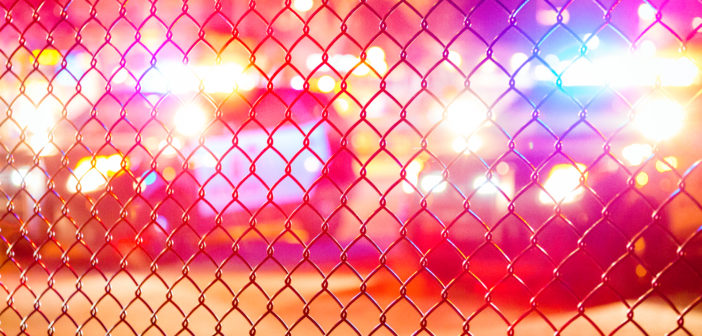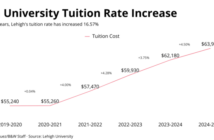Timothy J. Piazza.
Two student deaths at Pennsylvania schools related to alcohol. Two student deaths where peers failed to call for help until it was too late.
Lehigh’s medical amnesty policy protects both the student who calls for help and the student in need of help from the university conduct system. Christopher Mulvihill, the associate dean of students, said Lehigh’s policy first went into effect on March 14, 2007, after two members of Student Senate brought the idea of a medical amnesty policy to his attention.
However, the policy does not protect the student in need of help from legal repercussions. Because it can’t.
Pennsylvania law states a person shall be immune from prosecution for consumption or possession solely if law enforcement became aware of the violation because “the person placed a 911 call, or a call to campus safety, police or emergency services, in good faith, based on a reasonable belief and reported that another person was in need of immediate medical attention to prevent death or serious injury.” The person must also be the first one to place such a call for help for that incident, must provide their own name to the emergency officer and must remain with the person needing medical attention until emergency services arrive.
The state law, however, does not protect the student requiring assistance. Now, members of the Lehigh student community are seeking to change that.
“The only other state besides Pennsylvania in the surrounding area that doesn’t have a full medical amnesty policy, which means that the person that calls for help, as well as the person that is in need of help, receives full amnesty from any legal consequences, is Ohio,” said Matt Rothberg, ’18, the president of Student Senate. “That’s a big gaping hole in the legal system of Pennsylvania.”
Rothberg said, in contrast to the alcohol policy, when someone calls emergency services for a friend suffering from a drug overdose, both are fully protected from legal consequences in the state of Pennsylvania.
Last semester, President John Simon approached Rothberg and Nikki Nester, ’18, the president of peer health advisers, about initiating the effort to change medical amnesty policy.
“Once President Simon asked us, we both agreed immediately that it was something that had to be done and there was no question of whether we would help or not,” Nester said. “I personally knew by achieving this it could help to make an enormous positive impact on not just Lehigh’s student body, but also every other institution in Pennsylvania.”
Rothberg and Nester immediately got to work.
“What we came up with was, there are hundreds of thousands of students across Pennsylvania, why can’t we get all of us to get together and say we need change,” Rothberg said.
Rothberg contacted most of the student government leaders in Pennsylvania and got the support of the representatives for 110,000 students. He worked closely with Katie Jordan, the Penn State University Park undergraduate association president, and Max Kneis, University of Pittsburgh’s student government president.
Rothberg said the three drafted a letter and checked it with their respective student groups.
“(We) sent it out to all the various schools and had them sign on if they agreed with everything that was in the contents of that letter,” he said.
Before they were contacted by Rothberg, medical amnesty was an issue that both Kneis and Jordan had been working on at their universities.
“Last year we focused our efforts at Pitt on expanding Pitt’s student code of conduct to expand the medical amnesty clause,” Kneis said. “We want to do anything we can to provide the most safe experience for students here on campus and reducing the barriers for someone calling for medical help for someone who needs it is definitely in the interest of increasing student safety.”
Like Lehigh, Pitt has had its share of close calls.
Kneis said in January an incident occurred where a student had too much to drink and was brought to the hospital. The student survived, but the entire Greek system at the university is now on social probation.
“If the group had not brought the student to the hospital who knows what would have happened,” Kneis said, “but I think any hesitation they had really needs to be reduced because we want to save peoples lives first and foremost.”
Jordan was also working on medical amnesty policy at Penn State. She said Rothberg reached out to her in October to help to change the state law.
After Piazza’s death at the university last year, Jordan wanted to eliminate barriers that stop students from calling for help.
“Although ultimately you would like to think everyone would call regardless of getting in trouble — because a life is more important than the consequences — we’ve seen that’s not always the case, and sometimes people are a little bit more likely to be nervous about calling,” Jordan said. “So we initially wanted to work on eliminating barriers, there were some instances that happened at Penn State last year, specifically with Beta Theta Pi and a lot of the questions surrounding that were, ‘Why didn’t they call for help?’ and although none of us will actually ever probably know the reason, there could be this barrier that we want to eliminate regardless.”
The Lehigh community received an email from Rothberg on Feb. 20 with a letter detailing the student leaders’ progress and their goals for medical amnesty reform.
While Rothberg worked on contacting Pennsylvania student government leadership, Nester worked on the political side.
Nester said she researched which state legislators would be the most appropriate to approach and ask for support with this policy change. Nester then circulated a letter, including Rothberg’s petition, to 11 Pennsylvania state legislators and one United States Congressman.
On March 23, Senate Bill 1090, or the Timothy J. Piazza anti-hazing law was introduced by Senator Jake Corman, along with other members of the General Assembly. Section 2810 outlines a “safe harbor” clause, which protects both the individual calling for help as well as the individual needing medical attention.
If passed, this law would provide the comprehensive medical amnesty reform Rothberg, Jordan, Kneis and Nester have been fighting for.
Nester said she is dedicated to seeing this effort through, even if it is not accomplished before graduation.
“This is something that we feel like could happen and by doing this, even if we don’t get it accomplished, I still am going to be happy that at least we tried,” Nester said, “because it’s important to get your voice out.”






Comment policy
Comments posted to The Brown and White website are reviewed by a moderator before being approved. Incendiary speech or harassing language, including comments targeted at individuals, may be deemed unacceptable and not published. Spam and other soliciting will also be declined.
The Brown and White also reserves the right to not publish entirely anonymous comments.
1 Comment
Despite assurances that the individual who calls 911 will not face criminal prosecution and that neither the student calling or the student in need will face University disciplinary action, why is it that bystander intervention is still so low? It certainly cannot be entirely out of concern that the student in need might end up with a misdemeanor alcohol citation and, for that reason, something tells me that incorporating that additional layer of immunity won’t instigate a tidal wave of medical amnesty calls.
But let’s say that it does. Let’s say that, by removing the threat of criminal prosecution against the individual for whom medical help is called, more bystanders are encouraged and, in fact, do call for help. It saves lives and that’s fantastic. Yet now there’s a new problem. Alcohol deterrence laws, such as those against underage drinking and public intoxication, are completely undermined. Drinks 1-5 and you’re buzzed and fun drunk, yet you could still be cited or arrested for underage drinking, public intoxication etc. Drinks 6+ and you’re sloppy drunk and throwing up in the basement bathroom of a house on Hillside or while walking down East 5th Street, call medical transport and pass go and collect your $200. If someone could avoid prosecution by drinking to excess, there’s no reason to stop until you get that wasted.
I think the answers are pretty clear:
To my first point, if you see someone throwing up, despondent, or passed out, use your brain to realize that he or she might need medical assistance and call 911. Nothing will happen to you. If they get in trouble, well better they ended up with a citation than dead, and if they disagree, screw ’em. You will have done the right thing, and you know it.
To my second point, if you drink to excess to the point where you end up in the hospital, maybe you deserve more than just a hangover and the awful aftertaste of charcoal the nurses made you swallow to induce vomiting.